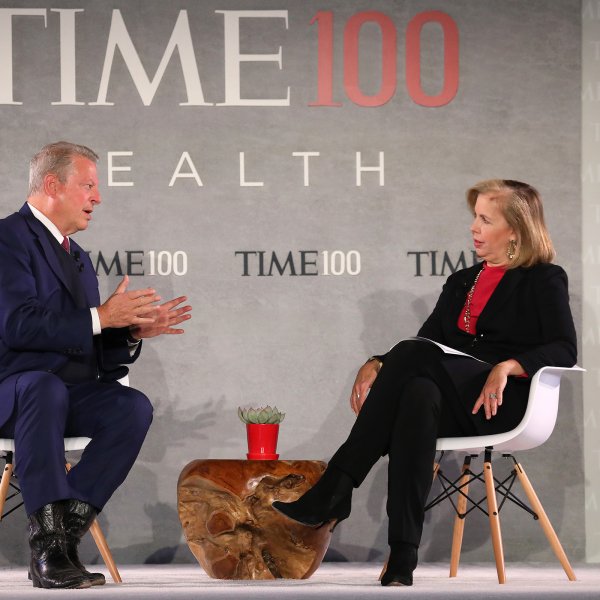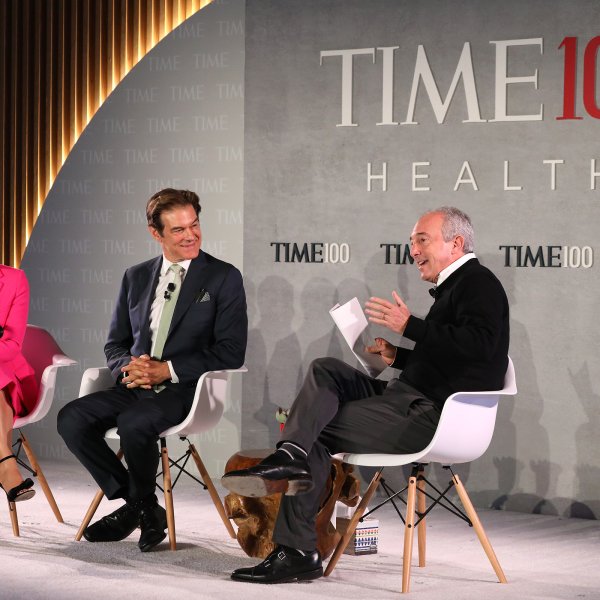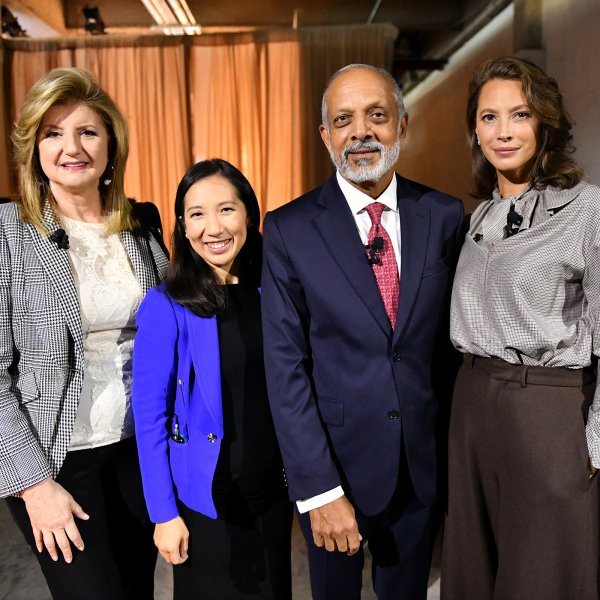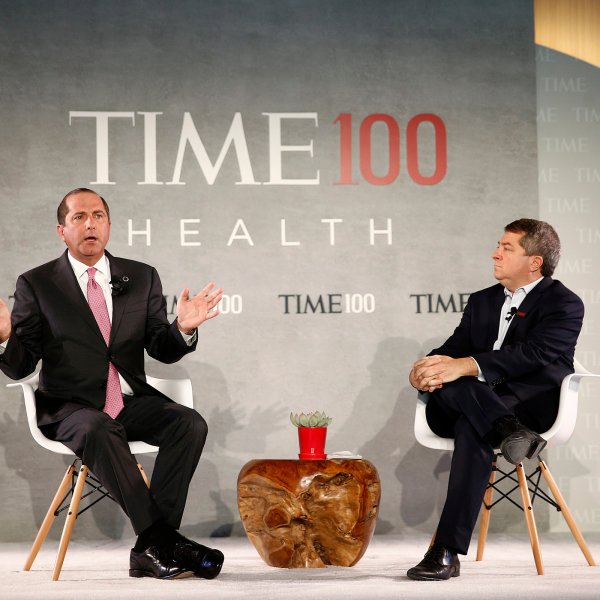<!-- wp:gutenberg-custom-blocks/featured-media {"id":"5703976","url":"https://api.time.com/wp-content/uploads/2019/10/time-100-health-summit-061.jpg","caption":"Former U.S. President Bill Clinton (L) speaks with Dr. David Agus, CEO of the Lawrence J. Ellison Institute for Transformative.Medicine at USC during the TIME 100 Health Summit at Pier 17 in New York City on Oct. 17, 2019.","credit":"Brian Ach—Getty Images for TIME 100 Health","mediaSize":"medium-jw","playlistId":"En4oHFx8","goJwPlayer":true} -->
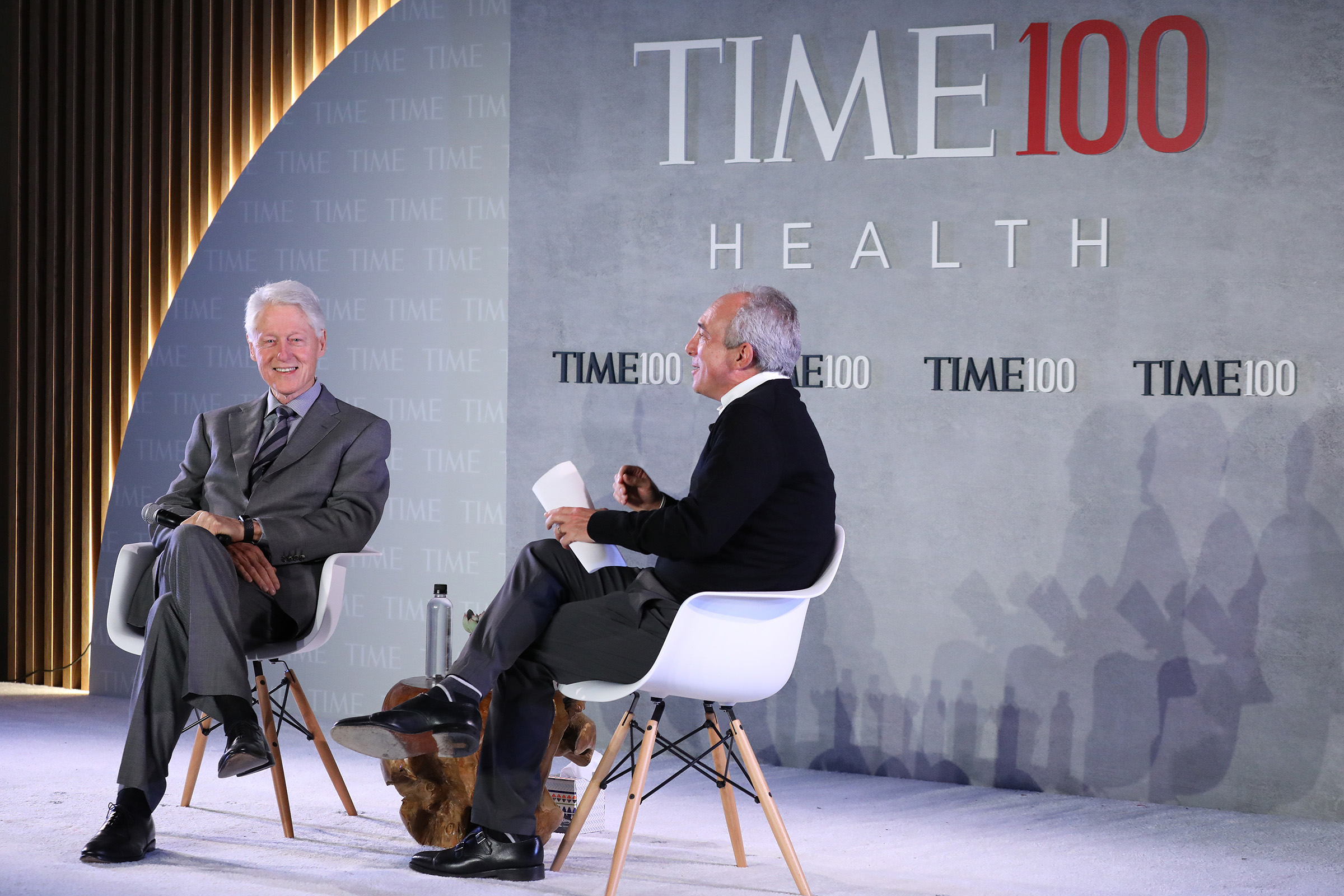
<!-- /wp:gutenberg-custom-blocks/featured-media --><!-- wp:paragraph -->
TIME held its first TIME 100 Health Summit on Thursday aiming to define — and shape — the future of health care. The Summit, which is an offshoot of the magazine’s annual TIME 100 list of influential people, featured scientists, politicians and entertainers, such as former President Bill Clinton, former Vice President Al Gore, NIH Director Dr. Francis Collins, actress Selma Blair, NBA commissioner Adam Silver, comedian Tig Notaro and former Planned Parenthood President Dr. Leana Wen.
More Coverage
<!-- /wp:paragraph --><!-- wp:paragraph -->
The day included a range of interviews, panels and performances. Here are the biggest moments from the Summit.
<!-- /wp:paragraph --><!-- wp:heading -->
Former Vice President Al Gore told Nancy Gibbs it’s not impossible for the Senate to vote to convict and remove the President
<!-- /wp:heading --><!-- wp:gutenberg-custom-blocks/video-jw {"mediaId":"GpIXazHV","autostart":false} -->
<!-- /wp:gutenberg-custom-blocks/video-jw --><!-- wp:paragraph -->
Former Vice President Al Gore told former TIME Editor-in-Chief Nancy Gibbs that it’s possible the House of Representatives could impeach President Donald Trump and the Senate could vote to convict and remove him from office. “It’s probably still unlikely the Republican Senate would convict, but I don’t think it’s any longer possible to say that’s a certainty by any means,” he said. “Of course most people have assumed that the Republican controlled Senate would never convict and remove. I don’t know, the evidence still matters.”
<!-- /wp:paragraph --><!-- wp:paragraph -->
Gore also urged Americans to vote out politicians in both parties who oppose policies meant to combat climate crisis. “If you care about this climate crisis, make sure that this election next year is a wave election in favor of saving the climate,” he said. Gore stressed the impact climate change has already had on human health around the world; heat stress, endemic topical diseases, and air pollutants have already caused deaths across the globe.
<!-- /wp:paragraph --><!-- wp:heading -->
NBA Commissioner Adam Silver addressed the NBA-China controversy
<!-- /wp:heading --><!-- wp:gutenberg-custom-blocks/video-jw {"mediaId":"bR37Uy4F","autostart":false} -->
<!-- /wp:gutenberg-custom-blocks/video-jw --><!-- wp:paragraph -->
NBA commissioner Adam Silver told Good Morning America‘s Robin Roberts that he’s willing to deal with the business consequences of Houston Rockets general manager Daryl Morey’s Oct. 4 tweet in support of protesters in Hong Kong. The tweet angered the Chinese government and lead Chinese sponsors to pull from games.
<!-- /wp:paragraph --><!-- wp:paragraph -->
In his first U.S. interview about the controversy since returning from China, Silver said the NBA is “not only willing” to cope with losses of millions in revenues, “but we are. The losses have already been substantial. Our games are not back on the air in China as we speak, and we’ll see what happens next.”
<!-- /wp:paragraph --><!-- wp:paragraph -->
Silver told Roberts that he was “confused” by the media’s coverage of the NBA’s response to Morey’s tweet. “Only because I had thought we’d taken a principled position. I thought we hadn’t so-called acquiesced to the Chinese.”
<!-- /wp:paragraph --><!-- wp:paragraph -->
“Maybe I was trying too hard to be a diplomat,” he said. “I didn’t see it as my role as the commissioner of the NBA to weigh in on the substance of the protest, but to say here’s this platform” for free expression.
<!-- /wp:paragraph --><!-- wp:paragraph -->
Silver also spoke about the issue of mental health in the industry: “I see it in sports…at least historically, there was a stigma around getting help for mental health issues.”
<!-- /wp:paragraph --><!-- wp:heading -->
Actress Selma Blair discussed her multiple sclerosis with Dr. Mehmet Oz
<!-- /wp:heading --><!-- wp:gutenberg-custom-blocks/video-jw {"mediaId":"reSdnkVI","autostart":false} -->
<!-- /wp:gutenberg-custom-blocks/video-jw --><!-- wp:paragraph -->
“I burned all the time. I felt like I got arthritis,” actress Selma Blair said when describing undiagnosed symptoms she experienced in her 30s. Then, in 2018, she got a diagnosis: multiple sclerosis (MS), a disease in which the immune system attacks the protective shell of nerve fibers. Blair has since become an advocate for people living with incurable diseases.
<!-- /wp:paragraph --><!-- wp:paragraph -->
“I’ve heard so much from people with chronic diseases and MS,” she said. “They’re scared, and they don’t know when it’s going to get worse. I see people get so isolated.”
<!-- /wp:paragraph --><!-- wp:paragraph -->
Dr. Mehmet Oz, a surgeon and host of The Dr. Oz Show, spoke about the difficulties patients face when living with chronic diseases. Just last month, Oz revealed that his mother was diagnosed with Alzheimer’s. “I recognize that if we start treating people as soon as they have Alzheimer’s, we’ve still missed the boat,” he said. “I can slow down her progression, but she’s not going to be the sharp woman who was able to negotiate any political scenario, like she was when I was younger.”
<!-- /wp:paragraph --><!-- wp:gutenberg-custom-blocks/inline-image {"id":5703685,"url":"https://api.time.com/wp-content/uploads/2019/10/time-100-health-summit-041.jpg?quality=85\u0026amp;w=560","caption":"Actor Selma Blair (L) and and Dr. Mehmet Oz arrive at the TIME 100 Health Summit at Pier 17 in New York City on Oct. 17, 2019.","credit":"Craig Barritt—Getty Images for TIME 100 Health","mediaSize":"portrait_small_2x","width":560,"height":373} -->
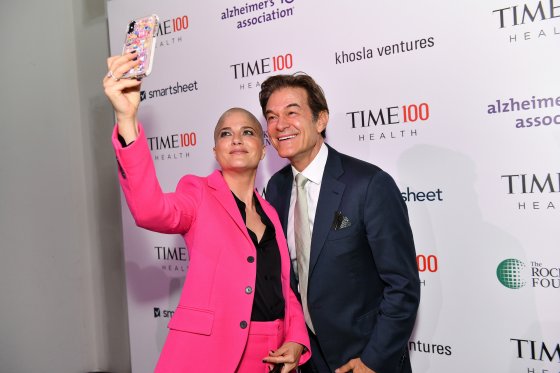
<!-- /wp:gutenberg-custom-blocks/inline-image --><!-- wp:paragraph -->
Leading scientists also spoke about the progress researchers have made to treat diseases once thought to be incurable. Maria Carrillo, chief science officer of the Alzheimer’s Association, said she feels encouraged by scientific develops in other fields of medicine that could become models for fighting disease. “All we need is to crack that window open,” she said. “And we can open the floodgates.”
<!-- /wp:paragraph --><!-- wp:heading -->
Secretary of Health and Human Services Alex Azar Called Medicare for All “simplistic,” arguing it would end up “Medicare for None.”
<!-- /wp:heading --><!-- wp:gutenberg-custom-blocks/video-jw {"mediaId":"xxwBEj97","autostart":false} -->
<!-- /wp:gutenberg-custom-blocks/video-jw --><!-- wp:paragraph -->
U.S. Department of Health and Human Services (HHS) Secretary Alex Azar called Medicare for All a “utopian” and “simplistic” approach to health care, adding it would end up being “Medicare for None.” “The reason we’re seeing the attractiveness of simplistic notions like Medicare for All is that the Affordable Care Act (ACA) made a lot of promises. It didn’t deliver on them,” Azar said.
<!-- /wp:paragraph --><!-- wp:paragraph -->
When asked by Editor-in-Chief Edward Felsenthal whether health care is a human right, which Massachusetts Sen. Elizabeth Warren has argued, Azar said HHS wants everyone to have “access to affordable health care that meets your needs, [and] that’s the highest quality that can possible be delivered…what bows you wrap around that, I don’t know.” He added that the U.S. needs better individual market solutions, and that many people like the health care coverage they have now.
<!-- /wp:paragraph --><!-- wp:paragraph -->
Azar also spoke about the Trump Administration’s plan for health care, saying the system should be “personalized, affordable and patient-centric.” He said the administration also wants to focus on public health crises including youth vaping, opioid addiction, maternal mortality and geographic disparities in health.
<!-- /wp:paragraph --><!-- wp:heading -->
Former head of Planned Parenthood Leana Wen addressed her tweet that abortion should be “safe, legal and rare.”
<!-- /wp:heading --><!-- wp:gutenberg-custom-blocks/video-jw {"mediaId":"Tt7gZJPD","autostart":false} -->
<!-- /wp:gutenberg-custom-blocks/video-jw --><!-- wp:paragraph -->
Leana Wen, the former head of Planned Parenthood and professor at George Washington University, addressed her controversial tweet on Tuesday that abortion should be “safe, legal and rare.” Many abortion rights activists disagree with the the Clinton-era phrase, arguing the term “rare” stigmatizes the procedure.
<!-- /wp:paragraph --><!-- wp:paragraph -->
Wen told Arana Huffington that she’s “deeply disturbed by how health care has become so politicized.” “So much so that we cannot even discuss our points of agreement and the nuanced views that many people can have without being attacked from all sides,” she said.
<!-- /wp:paragraph --><!-- wp:paragraph -->
Wen continued: “A lot of us believe that abortion is a complex moral issue. And we may not want to have an abortion ourselves but would never get in the way of somebody else making this deeply personal medical decision for themselves. Or maybe we’re even uncomfortable about abortion but would not want women to die because they don’t have access to safe, legal abortion either.”
<!-- /wp:paragraph --><!-- wp:gutenberg-custom-blocks/inline-image {"id":5703820,"url":"https://api.time.com/wp-content/uploads/2019/10/time-100-health-summit-050.jpg?quality=85\u0026amp;w=560","caption":"(L-R) Dr. Leana Wen, Christy Turlington Burns, Dr. Naveen Rao and Arianna Huffington speak onstage during the TIME 100 Health Summit at Pier 17 in New York City on Oct. 17, 2019.","credit":"Brian Ach—Getty Images for TIME 100 Health","mediaSize":"portrait_small_2x","width":560,"height":373} -->
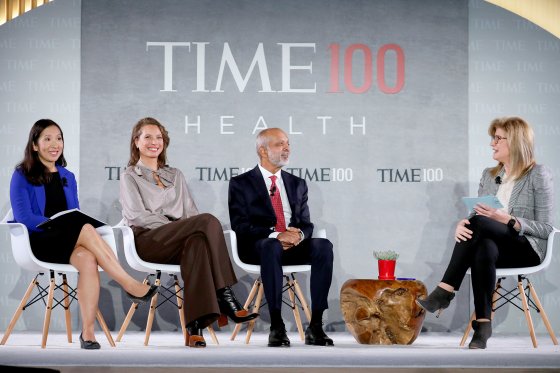
<!-- /wp:gutenberg-custom-blocks/inline-image --><!-- wp:heading -->
Former President Bill Clinton weighed in on the Democrats’ health care debate
<!-- /wp:heading --><!-- wp:gutenberg-custom-blocks/video-jw {"mediaId":"Q0kVvUj8","autostart":false} -->
<!-- /wp:gutenberg-custom-blocks/video-jw --><!-- wp:paragraph -->
Former President Bill Clinton said that the U.S. is “at a crossroads” on health care reform and “we should pick the low hanging fruit first,” when speaking with Dr. David Agus, director of USC’s Lawrence J. Ellison Institute for Transformative Medicine. “The problem is the system is still entirely too complex,” Clinton said. “The premiums are going up way more than wages are going up, and the co-pays and deductibles and the drug prices are going up even more than the premiums. So, we’re kind of at a crossroads now.”
<!-- /wp:paragraph --><!-- wp:paragraph -->
“I think we need to pass a public option and go back to encouraging all-payer systems in states so that you can have some control over the costs and keep it as simple as possible,” Clinton continued.
<!-- /wp:paragraph --><!-- wp:paragraph -->
His comments came just two days after multiple leading candidates in the Democratic presidential primary, such as Sen. Elizabeth Warren or Sen. Bernie Sanders, advocated for Medicare for All, a single-payer proposal, in the primary’s fourth debate. “The great appeal for the single-payer system is it’s universal and it’s simple,” Clinton said on Thursday.
<!-- /wp:paragraph --><!-- wp:heading -->
Prune Nourry, a French multidisciplinary artist, spoke about her upcoming film Serendipity
<!-- /wp:heading --><!-- wp:gutenberg-custom-blocks/video-jw {"mediaId":"5XXu2Cac","autostart":false} -->
<!-- /wp:gutenberg-custom-blocks/video-jw --><!-- wp:paragraph -->
Prune Nourry, whose upcoming documentary Serendipity depicts her battle against breast cancer, spoke with TIME’s senior health correspondent Alice Park about how her health has impacted her art.
<!-- /wp:paragraph --><!-- wp:paragraph -->
Park asked about Nourry’s latest sculpture, “The Amazon,” the creation of which is included in Serendipity. “As a sculptor, I felt through [breast] reconstruction that I was becoming the sculpture. That sculpture, the Amazon, was a way for me to get back to being the sculptor,” she said. “It became my catharsis.”
<!-- /wp:paragraph --><!-- wp:gutenberg-custom-blocks/inline-image {"id":5704284,"url":"https://api.time.com/wp-content/uploads/2019/10/time-100-health-summit-079.jpg?quality=85\u0026amp;w=560","caption":"Artist Prune Nourry speaks from the audience during the TIME 100 Health Summit at Pier 17 in New York City on Oct. 17, 2019.","credit":"Brian Ach—Getty Images for TIME 100 Health","mediaSize":"portrait_small_2x","width":560,"height":373} -->

<!-- /wp:gutenberg-custom-blocks/inline-image --><!-- wp:paragraph -->
Part of “The Amazon” is covered in joss sticks, evoking the acupuncture needles Nourry used during her treatment to maintain feeling in the ends of her fingers, which she needs as a sculptor. “I think rituals are important, when you’re ill, to celebrate every different step,” she explained. “And at the end of the treatments I decided to create this sculpture, like a celebration.”
<!-- /wp:paragraph --><!-- wp:heading -->
Seema Verma, the administrator of the Centers for Medicare and Medicaid Services, called Medicare for All “scary”
<!-- /wp:heading --><!-- wp:gutenberg-custom-blocks/video-jw {"mediaId":"V8mANrIc","autostart":false} -->
<!-- /wp:gutenberg-custom-blocks/video-jw --><!-- wp:paragraph -->
Seema Verma, the administrator of the Centers for Medicare and Medicaid Services under the Trump Administration, called Medicare for All “scary” in a conversation about drug and health care pricing with Kaiser Permanente CEO Bernard Tyson and Agus.
<!-- /wp:paragraph --><!-- wp:paragraph -->
“I’m always very concerned that we’re hearing conversations about more government, more Medicare for All. I think those kinds of things are very scary to me,” she said. “We see the day-to-day problems with a government run system.”
<!-- /wp:paragraph --><!-- wp:paragraph -->
When pressed about whose responsibility it would be to lower drug prices, Verma said the government would have a role taking care of the U.S.’s most vulnerable, using programs like Medicaid and Medicare. But she said, “At the end of the day though, patients have to be empowered to make decisions about their care. They need to be in the driver’s seat,” she said. “Turning over negotiation to the government doesn’t work well.”
<!-- /wp:paragraph --><!-- wp:heading -->
23andMe co-founder Anne Wojcicki spoke about the future of DNA testing
<!-- /wp:heading --><!-- wp:gutenberg-custom-blocks/video-jw {"mediaId":"IwWxRmyl","autostart":false} -->
<!-- /wp:gutenberg-custom-blocks/video-jw --><!-- wp:paragraph -->
23andMe co-founder Anne Wojcicki said people will grow used to genetic testing as time goes on, likening privacy concerns to worries about putting credit-card information online some had decade. “The reality is with a new technology, it just takes time for people to be comfortable with it,” Wojcicki said. “We believe you own your genome and you should do with it what you want.”
<!-- /wp:paragraph --><!-- wp:paragraph -->
Geneticist Eric Lander, president and founding director of the Broad Institute of MIT and Harvard, spoke about the recent bounds forward in genome sequencing technology. “I wouldn’t in my wildest dreams have predicted where we’d get to,” Lander said. “I would have underestimated where we’re going.”
<!-- /wp:paragraph --><!-- wp:heading -->
Comedian Tig Notaro spoke about how humor helped her deal with her 2012 cancer diagnosis
<!-- /wp:heading --><!-- wp:gutenberg-custom-blocks/video-jw {"mediaId":"YfQ3XisB","autostart":false} -->
<!-- /wp:gutenberg-custom-blocks/video-jw --><!-- wp:paragraph -->
“I kept thinking maybe I was cursed,” Notaro said, speaking about the devastating moment she was diagnosed in 2012. “When I went in for my appointment and was diagnosed with invasive cancer, it took my breath away in horror—and like, oh my god, this is hilarious. Of course, it wasn’t hilarious but something has to break the tension.”
<!-- /wp:paragraph --><!-- wp:paragraph -->
Notaro, who has joked about her health in lauded comedy sets, told TIME editor-at-large Belinda Luscombe that comedy was a helpful tool for processing her illness. Notaro had a double mastectomy and chose to show her surgery scars in her 2015 comedy special Boyish Girl Interrupted, which aired on HBO.
<!-- /wp:paragraph --><!-- wp:paragraph -->
“When you’re in these places of despair and pain, sometimes you need to be able to speak in that space … and for people to be able to sit in that moment with somebody and accept that and not try and suffocate them with ‘You’re going to be okay,’” she said.
<!-- /wp:paragraph --><!-- wp:heading -->
Fitbit CEO announced partnership with Bristol-Myers Squibb-Pfizer Alliance
<!-- /wp:heading --><!-- wp:gutenberg-custom-blocks/video-jw {"mediaId":"ZDAtcuBN","autostart":false} -->
<!-- /wp:gutenberg-custom-blocks/video-jw --><!-- wp:paragraph -->
Fitbit CEO and co-founder James Park announced a new partnership the Bristol-Myers Squibb Pfizer Alliance, a joint effort between two pharmaceutical companies to raise awareness about atrial fibrillation (AFib), also known as a quivering or irregular heartbeat. Fitbit will work with the alliance to detect symptoms and educate people with the condition.
<!-- /wp:paragraph --><!-- wp:paragraph -->
“Just getting an alert can overly alarm people,” Park said. “People don’t know what to do, doctors don’t know what to do with it. So, along with the BMS-Pfizer Alliance, we want to fill in all those gaps and complete that entire health care pathway around you.” Fitbit is in conversation with the FDA to approve their AFib detection software.
<!-- /wp:paragraph --><!-- wp:heading -->
Last Mile Health CEO Raj Panjabi said underpaid women subsidize health care
<!-- /wp:heading --><!-- wp:gutenberg-custom-blocks/video-jw {"mediaId":"UTpVcFLO","autostart":false} -->
<!-- /wp:gutenberg-custom-blocks/video-jw --><!-- wp:paragraph -->
Dr. Raj Panjabi, CEO and founder of Last Mile Health, spoke about how women are often under valued and underpaid in the health care space. “Male-dominated professions are under-recognizing and under-valuing frontline caregivers, be they nurses, midwives or community health workers,” he said. His organization Last Mile Health trains individuals without a medical background to be community workers. “The poorest women on Earth subsidize health care globally to the tune of $1 trillion with their unpaid and underpaid work,” Panjabi said. “That’s larger than the economies of over 150 countries.”
<!-- /wp:paragraph --><!-- wp:gutenberg-custom-blocks/inline-image {"id":5704283,"url":"https://api.time.com/wp-content/uploads/2019/10/time-100-health-summit-078.jpg?quality=85\u0026amp;w=560","caption":"Co-Founder \u0026amp;CEO of Last Mile Health, Dr. Raj Panjabi (L), and Nation Editor at TIME Haley Sweetland Edwards speak onstage during the TIME 100 Health Summit at Pier 17 in New York City on Oct. 17, 2019.","credit":"Brian Ach—Getty Images for TIME 100 Health","mediaSize":"portrait_small_2x","width":560,"height":373} -->
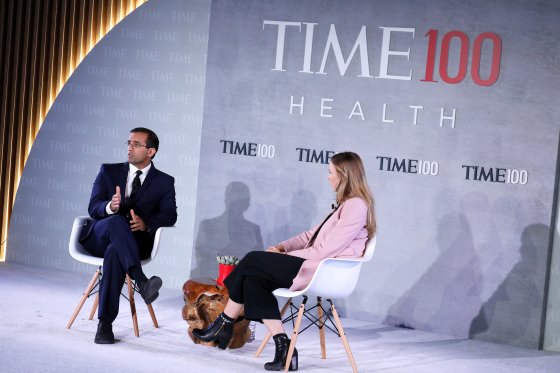
<!-- /wp:gutenberg-custom-blocks/inline-image --><!-- wp:heading -->
Experts spoke about changing the nature of health care research with collaboration and innovation
<!-- /wp:heading --><!-- wp:gutenberg-custom-blocks/video-jw {"mediaId":"6LmCQbGE","autostart":false} -->
<!-- /wp:gutenberg-custom-blocks/video-jw --><!-- wp:paragraph -->
Sean Parker, an entrepreneur and founder of the Parker Institute for Cancer Immunotherapy — who also co-founded Napster and was the first president Facebook — described the field of health care research as looking and feeling like the “early internet.” “It seemed like there was tremendous opportunity,” he said. The Parker Institute aims to connect doctors and share information among researchers. Other experts on the panel agreed that collaboration between researchers is crucial for making progress.
<!-- /wp:paragraph -->
